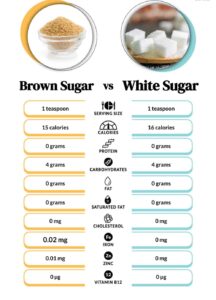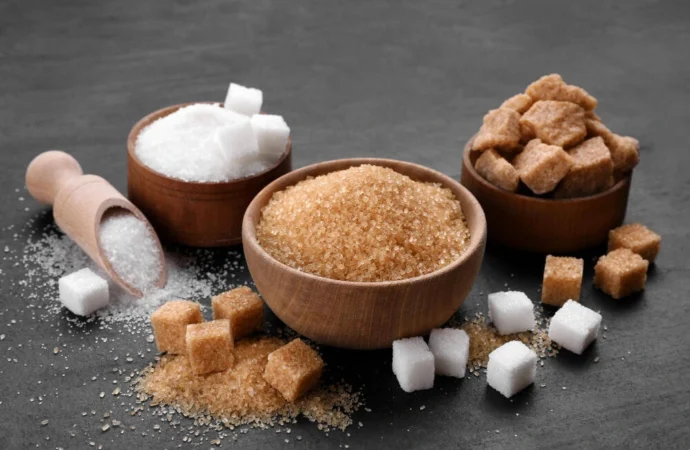Sugar is a common part of many diets, found in tea, coffee, sweets, and processed foods. While it adds flavor and quick energy, excessive sugar intake is linked to obesity, diabetes, and heart disease. As health awareness grows, people often view brown sugar as a healthier option due to its darker color and natural image. However, is this belief accurate, or is it just clever marketing? In this article, we’ll break down the differences between brown and white sugar and determine whether one is truly better for your health or just a misconception.
What’s the Difference Between Brown Sugar and White Sugar?
Before we dive into their health impacts, it’s important to understand how brown and white sugar differ.
-
White Sugar is highly refined. It undergoes processing to remove molasses and impurities, leaving behind pure sucrose. The result is a dry, white, and neutral-tasting sugar used in various recipes.
-
Brown Sugar starts as white sugar but has molasses added back in. This gives it its brown color, slightly moist texture, and richer flavor. The molasses also adds trace amounts of minerals like calcium, potassium, and iron — though these amounts are too small to offer significant nutritional value.
Nutritional Comparison

When it comes to nutrition, brown and white sugar are more alike than most people think. Here’s a detailed breakdown of their differences:
-
Calories:
-
White Sugar: Approximately 16 calories per teaspoon.
-
Brown Sugar: Roughly 15–17 calories per teaspoon.
-
➤ The calorie difference is minimal and has little impact on your overall diet. Whether you choose brown or white sugar, your calorie intake remains nearly the same.
-
-
Minerals:
-
Brown Sugar contains trace amounts of calcium, iron, and magnesium due to molasses.
-
➤ While these minerals can be beneficial in the right quantities, brown sugar doesn’t provide enough to offer any real health benefit unless consumed in excessive (and unhealthy) amounts.
-
-
Sugar Content:
-
Both brown and white sugars consist mainly of sucrose, a simple carbohydrate.
-
➤ Sucrose gives you a quick energy boost, but it offers little to no nutritional value. Excessive consumption contributes to empty calories and doesn’t provide vitamins, fiber, or other nutrients that support your health.
-
-
Glycemic Index (GI):
-
Both sugars have a high GI, meaning they can cause a rapid spike in blood sugar levels when consumed.
-
➤ This spike can lead to energy crashes and increase the risk of insulin resistance if consumed regularly. Brown sugar doesn’t provide any advantage over white sugar in managing blood sugar levels.
-
-
Caloric Density:
-
Brown Sugar may seem less calorie-dense because of its moisture content from molasses.
-
➤ However, the difference is just 1–2 calories per teaspoon, which doesn’t significantly impact your overall calorie intake or weight management.
-
What About the Health Risks?
Excessive sugar intake—whether from brown or white sugar—can lead to various health problems. Some of the risks include:
-
Weight Gain: Both brown and white sugar contribute to excess calorie intake, which can lead to weight gain if consumed in large quantities.
-
Increased Risk of Diabetes: High intake of added sugars is linked to an increased risk of insulin resistance and type 2 diabetes. This applies to both brown and white sugar.
-
Tooth Decay: Sugars are a major cause of tooth decay, as they feed harmful bacteria in the mouth.
-
Heart Disease: Too much sugar can raise triglyceride levels, increasing the risk of heart disease.
Are There Healthier Alternatives?
If you want to reduce your sugar intake for health reasons, brown sugar isn’t significantly better than white sugar. The key isn’t choosing brown sugar over white sugar, but rather cutting down on overall sugar consumption. Here are a few healthier alternatives:
-
Stevia: A natural, zero-calorie sweetener derived from the stevia plant. It doesn’t raise blood sugar levels and is a popular choice for people reducing sugar intake.
-
Honey or Maple Syrup: Though still high in calories, these natural sweeteners contain antioxidants and some minerals. However, they should be used in moderation.
-
Coconut Sugar: Made from the sap of coconut trees, coconut sugar contains a small amount of nutrients and has a lower glycemic index than regular sugar. But, it’s still sugar and should be used cautiously.
The Bottom Line
Ultimately, brown sugar isn’t significantly healthier than white sugar. While it contains small amounts of minerals, the nutritional difference is negligible, and both types are high in empty calories with little value. If you want to make healthier choices, the best option is to reduce your overall sugar intake, regardless of whether it’s brown or white. Moderation is key, and making healthier food choices—such as eating more whole foods, drinking water, and using natural sweeteners—can help you avoid the health risks associated with excessive sugar consumption.
 Food Manifest
Food Manifest 


















